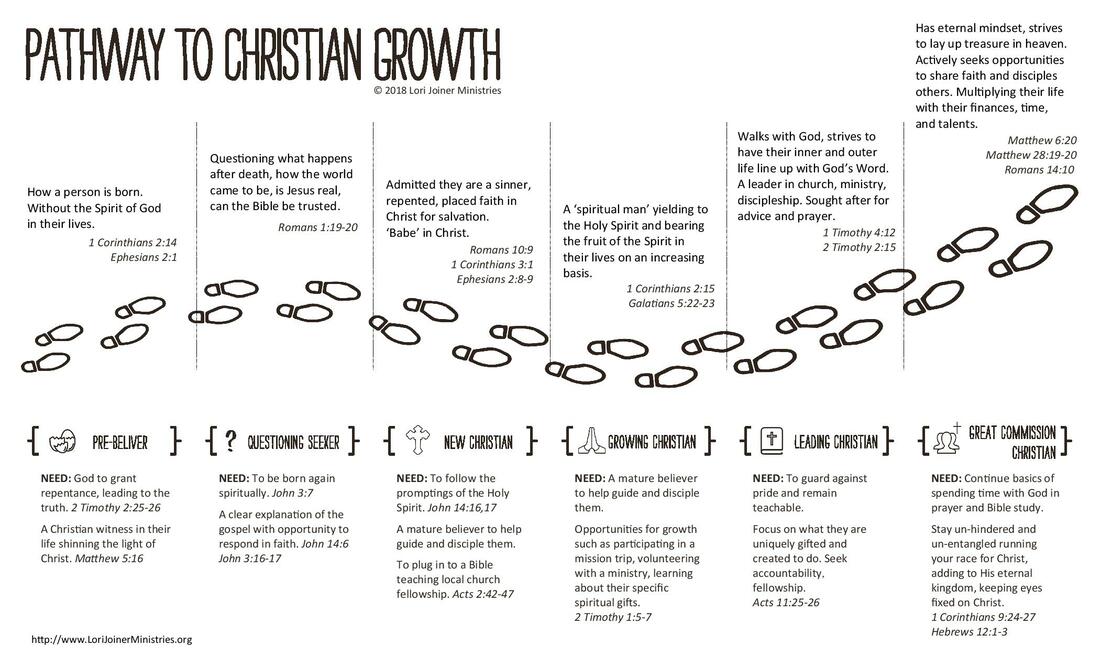|
Building Lego Towers
By Lori Joiner When my sons were younger, one of their chores was to tidy up their rooms. Often, I would send them to their rooms to begin the cleaning process and they would get sidetracked. Instead of putting laundry in baskets, or placing toys on shelves, or making their beds, they would start playing. One morning when I went to check on their progress, instead of following my instructions, they were building Lego towers. All the Legos were spread out, the room looked worse than before, and they had built very tall Lego towers. And while the tall Lego towers were impressive, that was not what I had asked them to do. I had made it clear their rooms needed to be cleaned before we left for the day. In a way, we as Christian adults have the exact same tendency when it comes to the Great Commission. Jesus has told us clearly what he wants us to focus on while we are on earth, awaiting His second coming. “Then Jesus came to them and said, “All authority in heaven and on earth has been given to me. 19 Therefore go and make disciples of all nations, baptizing them in the name of the Father and of the Son and of the Holy Spirit, 20 and teaching them to obey everything I have commanded you. And surely I am with you always, to the very end of the age.” Matthew 28:18-20 Jesus wants us to focus on making disciples. However, many of us are building Lego towers. We are doing everything but making disciples. We are: Attending church Attending Bible studies Volunteering Financially giving to great causes Building businesses Having lunch with friends Going on vacations Binge watching our favorite shows Carpooling kids to activities Discipleship often is not even on the list of activities that fill our schedules. I feel this too. I am raising two sons, I am a wife, I have dinner to get made this evening, swim team practice to take the boys to. I have emails to return, and old friend to meet for lunch tomorrow, and a ministry to run. I have a neighbor that needs some extra help in life right now, I have a dog to walk, a kid that needs to go to the orthodontist…and on it goes. So often, in the business of life, following the main thing Jesus told us to do is not only an afterthought-it is no thought at all. Many of the individuals that make up the body of Christ are not passing on the faith to the people around them. We are building Lego towers and not actually doing discipleship. Ok, I am being a bit fatalistic. I know a small handful of people doing this, I can count them on two hands. Even many people in full-time Christian work get too busy with other things and don’t truly meet with and disciple others in any ongoing way. I am not just observing this, I am not just writing about this, I am deeply burdened by this reality. So burdened that I launched a 501c3 ministry to full-time navigate into this area and see what God could use me to do to address this issue. What I have found is that people WANT to do this but are stuck. Stuck on a variety of issues such as: Where to find disciples How to start-literally what to say to get the ball rolling When to find time to meet with a disciple What to do when you meet-what does this discipleship time look like Personal hang ups-like feeling as if you don’t know enough, feeling as if you don’t have the right personality, feeling inadequate as you may not have ever been discipled yourself But there is hope! With God all things are possible! Even discipling someone with your busy schedule! Even discipling another person if you have never been discipled. Yes, even discipling someone with YOUR personality. And I am in your corner! I want to not only propel you in this endeavor-I want you to LOVE discipleship! I have a TON of resources to get you started disciplining someone this week! Your Discipleship Coach Podcast-This weekly 10-to-15-minute discipleship time will equip and encourage you in your discipleship efforts. Discipling Others Blog-Monthly Discipleship help covering all areas of discipleship. Start Here and Next Steps Bible Study workbooks-These straightforward Bible studies on the basics of the Christian faith are perfect place to start when discipling someone. Discipling Women-This resource breaks down the nuts and bolts of discipleship, explains the biblical basis for discipleship, and is packed full of helpful advice when discipling others. The Discipleship Starter Kit-This free resource offered on my website includes an 8-week calendar of what to do, day by day, to disciple others. The Time Is Now discipleship training retreat-This 4 talk retreat is specially geared to helping people, in one weekend, learn to disciple others. When I stand before the Lord I want to have done the things he specifically asked His followers to do. I don’t want to say face the Lord and show him Lego towers. I want to face him and show Him disciples. And I want to help you do the same. As I navigate this life and all the demands on my time, I am looking for lost souls, asking people if they want to grow spiritually, and keeping margin in my schedule for the women I can disciple and help spiritually. My goal, is that they too will turn around and pay it forward and disciple others also. My aim is to help you, and recruit you, to join me in this Great Commission effort. Let’s go build God’s Kingdom together!
0 Comments
When contemplating how long to disciple another person, there are several factors to consider.
How long has this person known Christ personally? How teachable are they initially? Do they have a desire to mature in Christ spiritually? These are just a few questions to ponder. We want to be realistic in committing our time and energy to a person. We also want to be a useful tool in their life, not dragging them along too long or cutting them off too short. I typically like to disciple someone for two years. It does not always work out this way, but here are some thoughts, ideas and general guidelines to help you think through that discipleship timeline. During year one, I am focusing on helping my disciple get grounded in the basic tenets of the Christian faith. I am continually pointing her to the Lord Jesus Christ. So throughout year one, we walk through, chapter by chapter, my Start Here Bible Study, Next Steps Bible Study and one other study I decide my disciple needs. This may be a study in how to share the gospel, a workbook I have done in the past by another Christian author, how to spend time with the Lord daily or how to study the Bible using the inductive Bible study method. Year One Goals:
Year Two Goals:
I had a gal I discipled one summer after I was married and had kids. She and I had a grand time together in discipleship and I had big plans for her life. However, she got a job in another city. Our schedules could no longer line up no matter how hard we would attempt to get together! Some women I have discipled are very mature in their faith in Christ and just needed some basic direction in discipling others. After 3-4 months they are off discipling others and do not really need me more than a semester. Others come from dysfunctional backgrounds with lots of lies planted in their heart about the nature of God. It takes time to unwind those lies with the truth of scripture. Their journey can simply take much longer. I usually commit for two years knowing there is a chance it could take longer to launch them into self-feeding discplemakers themselves! And other times, it can go much quicker! I applaud any effort you are taking to walk alongside another in discipleship. Way to go! Please let me know if you are hitting any roadblocks in your discipleship efforts. I can address it in a future blog post! So you are discipling a gal. Perhaps you led her to Christ, perhaps she asked you to disciple her. Maybe she is a woman in your church or small group you knew needed someone to come alongside her and help her grow deeper in the Lord.
Whatever the case may be, you need a plan. You may not feel the need for a plan at first. You may be meeting for coffee as she shares hard things in her life. You are giving biblical counsel and offering prayer. But over time, you will want a plan. An effective, thought-through pathway for her Christian growth. There are a two ways to think about structure when it comes to discipleship:
Structure During the First Year of Discipleship The First 9 Weeks: Week 1: Get to Know You Sheet Week 2-7: Start Here Six Foundational Lessons for Growth in Christ Bible Study Week 8: Bonus week! No discipleship appointment, do something fun! Nails, Sonic, walk, dessert at a fun new café, playdate with kids, craft, etc. NOTE: this week can be done ANY week during the first 8 weeks. Week 9: Discipleship Evaluation. You as the discipler, evaluate yourself. You as the discipler ask your disciple for feedback. Please see these two blog posts for how to do this, or my book chapter to see this as well. Pause Here. Is she plugged into a local church? Emphasize the importance for her further growth to be plugged into a local body of believers. She needs to be hearing from other biblical teachers and serving in an area of the church. Never underestimate the local church in her growth and development. The Second 9 Weeks: Week 10-16: Next Steps Seven Foundational Lessons for Growth in Christ Bible Study Week 17: Bonus Week, no discipleship. Do something fun! Care for a friend together, freezer meal prep, walk a nature trail, peruse a Christian bookstore. Week 18: Discipleship Evaluation. You, as the discipler, evaluate yourself. You, as the discipler, ask your disciple for feedback. Please see these two blog posts for how to do this or my book chapter to see this as well. Pause Here. Is she ready to disciple someone else? Is she living with her eyes open to how God can use her in the lives of others? Encourage her to invite others to church, to Bible study, to pray with and even disciple others. The Rest of the Year: Assess the growth of your disciple. Now that the basics are covered, assess what you think (as her discipler) she needs to focus on next. What is holding her back (if anything) from discipling someone else? Pray, seek God, and write down your list. Have your disciple think through what she thinks she needs as well. Does she need direction in …
I recall discipling a woman who had numerous questions about other religions. We had already studied the basics of the Christian faith together. Furthermore, her children, who attended public school, were always asking her questions about different religions as their classmates were a variety of these other belief systems. After much research, I bought us a Bible study on religions from a Christian worldview. We read a short workbook together and watched a video series that accompanied the chapters. I learned a ton doing this with her and she felt so much more confident answering her children’s questions. The Bottom Line Having structure in your discipleship journey during the first year discipling someone will help you feel confident in your spiritual investment. Instead of random and haphazard, you will week by week cover the basics of Christian faith and help your disciple build a solid foundation upon which to grow in Christ. She will have fun bonus weeks and input along the way! Eventually, prayerfully, she will use the same structure with another woman in the future! Exciting times! Hang in there! I would love your feedback! Did you find this helpful? Is there something else you use to guide your discipleship efforts? Feel free to contact me on my website to let me know how I can help! I want you to feel successful! In part one of this series, I explained the many reasons the first six weeks’ worth of Bible material with a disciple should be on autopilot. Starting with the basics of God’s love, Jesus being the way to a relationship with God, the role of the Holy Spirit in a believer’s life and others are all foundational topics which should always be covered first in a discipleship relationship.
Another area needing to be on autopilot is what to do during a typical discipleship appointment. Instead of winging it or fretting over it, the template of a discipleship appointment should not change. Matter of fact, this five-element template should be used 99 percent of the time with your disciple. Let’s explore each element of the discipleship appointment. Five Elements of a Discipleship Appointment Small Talk Small talk involves getting to know the disciple and different aspects of their life. This is an important step for task-oriented people. Make sure the person knows you care about all aspects of their life, not just the spiritual side. In small talk, you ask about their family, background, outside hobbies, etc. This sharing back and forth about life is done in each appointment. Don’t fall into the temptation to jump over this element to get to a checklist of items. This is an important time for you to gauge how your disciple is doing. Find out what is on their heart and mind that day. Being a task-oriented person myself, I used to have to write myself a note in my discipleship planner that said, “Lori, ask her how her day is going!” Accountability Accountability is when we reveal real struggles and shortcomings in our lives in order to receive help, guidance and support. It requires both vulnerability and authenticity. During accountability, both the discipler and disciple share about an area which is currently a struggle. Each agrees to ask each other about that area regularly. They pray for each other and encourage each other toward complete victory. The discipler should share about their struggles first to model authenticity and transparency. Perhaps you ask your disciple to hold you accountable to memorizing scripture and not yelling at your kids so often. They may ask you to hold them accountable to be more uplifting to their spouse, or in reaching out to neighbors and inviting them to church. Content The content portion is where you teach them from scripture something they can eventually pass on to another. This segment consists of time in the Word, perhaps doing a Bible study together. A discipleship appointment doesn’t merely consist of meeting together to talk and catch up. It needs biblical substance. There is content involved as you are discipling a person with an end in mind. You have a destination. Recall that the goal of discipleship is for them to look more like Christ and eventually disciple others. Time studying the Bible together helps accomplish this goal. I recommend the first six weeks of content with any disciple be the foundational biblical lessons in Start Here 6 Foundational Lessons for Growth in Christ. Prayer During the appointment, spend time praying for each other and for others. Ask God to help you both apply what you’ve learned during the content portion of the appointment, for items you shared about during accountability or small talk. Always pray for lost people in your life. These are family members and friends who have yet placed their faith in Christ as Savior and Lord. You may choose to write down these prayer requests so you can pray for your disciple daily until you meet again. Outreach This element includes modeling and teaching others along the way. When you are able, think about doing ministry together with your disciple. Perhaps you both meet with a new person who attended an outreach or visited your church for the first time. Let them watch and observe you as much as possible. I always want one of my disciples with me as I share the gospel with other women I am coming into contact with. They will learn more in one hour of real ministry than me telling them about it for five hours! Don’t Skip a Step If one of these elements is missing, your discipleship appointment will fall into one of two ditches. It could be overly academic with just a focus on Bible study, spiritual elements and skills you are perhaps trying to teach. It will lack the warmth and care small talk brings. Or, it will fall off into what I call ‘coffee and vent’ where there is only small talk, catching up and maybe prayer, but lacking needed biblical content. 99 Percent of the Time Recall I said this is the template you should use 99 percent of the time. The other one percent is the fact that life also happens and there will be situations, for whatever reason, you need to ditch the template. If your disciple comes into the appointment and has just suffered a broken engagement, a death of a loved one or the loss of a job, it may feel a bit cold to push through the five elements. You may need to simply be an encouraging, listening ear and prayerfully be used by God to offer care, wisdom and empathy. Having these elements of a disciple appointment on autopilot will take the guesswork out of planning to meet with your disciple. You can easily think through the elements, plug in what you want to teach and focus on for a particular appointment, and not feel you are winging it. Further, this helps your disciple learn what an appointment should look like when they disciple someone in the future. You are setting them up for future discipleship success. It may seem weird to use autopilot and discipleship in the same sentence. I mean, discipleship is a relationship with at least two people. Relationships are really not items we typically think of going on “autopilot," yet there are certain elements that most definitely need to be on autopilot.
Two items for autopilot are:
The First Six Weeks There is no need to wonder, with each new disciple, what material to cover. While there are so many wonderful topics to explore when it comes to God and the Bible, there is a very simple set of topics to start with. Always start with the basics: God, Jesus, the Holy Spirit, prayer, the Bible and the Great Commission. Always. Without exception. If the person is a brand new believer or a person who has been asking spiritual questions ... the same basic lessons. Your new disciple is unsure if she is a believer, she receives the same basic lessons. If she was raised in a Christian home and went to a Christian high school ... say it with me ... the same basic lessons. Autopilot, my friends. I have been discipling women for 28 years. Through trial and error and lots of experience, I have thus found starting with the basics first to be important for two main reasons. Back to the Basics We cannot assume our new disciple really has the foundational lessons nailed down. Do they deeply understand and believe God loves them? Do they think that one major screw up in high school made God mad and He is still making them pay penance? Have they ever been taught clearly about the Holy Spirit? Do they know He is an equal part of the Godhead and not a mist floating around or just an idea or a feeling? Do not assume they know why they can trust the Bible and how Jesus used scripture in the New Testament. We cannot assume these basic lessons are truly serving as a bedrock of their growing faith. Most likely there are many areas of confusion and biblical guessing going on. So bottom line, do not assume your disciple, no matter how religious their background, knows some of these basic foundational lessons from scripture. Preparing for the future Number two reason to always teach the basics first is that you must prepare your disciple for their future discipleship endeavors. Recall one of the goals of discipleship is your disciple would transfer and teach what they have learned to another person. So, if you are diligent to teach your disciple the basics of the Christian faith, then they are ready to teach those same lessons to the person they disciple. You are setting them up for a lifetime of discipleship. One cannot possibly know all the different types of people they may meet with. Yet, you can ensure they are starting off in the right direction by covering the basics first. Securing the foundation To reiterate, the first six weeks you meet with a disciple you are covering the basics of the Christian faith. You are teaching them about God’s love, how Jesus alone is the way to a relationship with this loving God, the Holy Spirit is God, prayer, trusting the Bible, and our overarching purpose in life -- the Great Commission. This part of your discipleship journey is squarely on autopilot. I felt so strong about this I wrote Start Here 6 Foundational Lessons for Growth in Christ. There is one for women’s groups and now a new edition to be used with men as well. Order yours today at https://www.lorijoinerministries.org/store.html. Talking With Your Disciple About Sin | Part 3 This is the third and last of three articles in this series Have you heard the saying, “The struggle is real!”? That statement is no more truer than when talking about sin. We desire to please God who loved us and saved us and is preparing a place for us for eternity with Him. And while we wait, we struggle with sins we wish we didn’t! What are we to do? And further, how are we to lead and guide our disciples in this area! Three Pitfalls to Identify There are three pitfalls when it comes to dealing with sin in our lives. We need to talk with our disciples about these three areas to see where they may be feeling stuck and in need of our loving guidance.
Condemnation originates from the Devil and is designed to keep you away from God. Whereas conviction originates from the Holy Spirit and is designed to bring you to God. When a person sins, the Devil will say words of condemnation. Say, for example, you explode in anger when your spouse/friend says something that makes you mad. You yell, rant and rave, and spew hateful words. The Devil will whisper condemning words to you such as, “You blew it again. You can’t talk to God, He is fed up with you! He is wanting you to get your act together before you talk to Him. You are such a loser, you will never get out of this anger cycle. It’s just who you are and you will never change.” The Holy Spirit, however, will quickly whisper words of conviction. He may say words such as, “Talk to God about this. Confess to Him you have sinned and ask for His forgiveness. Tell Him you feel powerless over this anger and need His help to change. You can overcome this with God. You need to also confess to the person you lost your temper with and ask for their forgiveness.” Condemnation is the devil’s way of keeping you locked in sinful actions and habits. Conviction is the Holy Spirit’s way of drawing you to God to make things right and eventually overcome with His help and power.
A person could erroneously reason that if all of our sins are forgiven and our salvation is secure in Christ, then why not sin to our heart's content? While technically this is true, salvation is based on faith in Christ not sins we have or will commit. A person who has truly been redeemed by Jesus Christ will not live a life characterized by continuous, willful sin. Genuine Christians are new creations (2 Corinthians 5:17) who demonstrate the fruit of the Spirit (Galatians 5:22-23), and not the acts of the flesh (Galatians 5:19-21). 1 John 3:6-9 clearly states that a true Christian will not live in continual sin. “6 No one who lives in him keeps on sinning. No one who continues to sin has either seen him or known him … 9 No one who is born of God will continue to sin, because God’s seed remains in them; they cannot go on sinning, because they have been born of God.” (NIV) So make sure you and your disciple are not using God’s grace as freedom to sin. Instead, double check if God is truly in your life as Savior and Lord.
It is important to understand that being tempted to sin is not the same as actually sinning. You may be tempted to cheat on a test. You may think about cheating on your taxes, you may think about speeding to your appointment, you may contemplate gossiping about a neighbor, but these are not sins. We sin when we actually follow through on one of these (or other) sinful acts. When the thought of sinning appears in the mind, we can seek the Holy Spirit to help us say NO to temptation and yes to pleasing God. We may even be able to recall a helpful scripture to remind ourselves to turn from a temptation. Instead of berating yourself for having the thought, we can thank God for rescuing us from following through with the sin. Take stock of each of these pitfalls and share with your disciple which one you tend to fall into most often. Together, you can both pray for each other, hold each other accountable and enjoy a closer walk with God! While we will not be sinless until we are in heaven with God for eternity, but we can strive, at least, to sin less and less. Talking With Your Disciple About Sin | Part 2
This is the second of three articles in this series Every Christian at some point will look back on their life with some remorse or regret. They may think about what could have been had they only walked with God at a deeper level at a certain time in their life. There may be regret from not trusting in Christ earlier in their life. They may regret that when they knew better, as a believer, they did not fully submit to His leading and thus made decisions they wish they could change. These feelings of regret and sorrow can cast a shadow on our walks with God now. Then can even impede what God wants to do in our lives in the future. It is important as a discipler in another person’s life to address this regret issue with truth from the Bible. Resting on Truth From the Bible The below set of verses from the book of Psalm is a great place to begin this discussion. Psalm 103:8-13 8 The Lord is compassionate and gracious, slow to anger, abounding in love. 9 He will not always accuse, nor will he harbor his anger forever; 10 He does not treat us as our sins deserve or repay us according to our iniquities. 11 For as high as the heavens are above the earth, so great is his love for those who fear him; 12 as far as the east is from the west, so far has he removed our transgressions from us. 13 As a father has compassion on his children, so the Lord has compassion on those who fear him; Each line of this Psalm, written by King David, is truly dripping with love and forgiveness from God. This passage describes God as compassionate, gracious and slow to anger. It says His love is higher than the heavens for those who fear him. We need to note here that fear in the Old Testament, where this book of Psalm is located, means faith and reverence for God, not a fear such as being scared or fearful of something bad happening. This passage goes further to explain how God removes our sins from us as far as the east is from the west. How far is the east from the west? Exactly-incalculable! This is great news as when I confess my sins to God, and when your disciple confesses their sins to God, they are removed! We are the ones who tend to bring them back up and beat ourselves up for them ... not God! This passage can truly give us great hope that God loves us, removes our sins from us and has compassion on us. Forgetting What is Behind In Philippians 3:13-14 Paul says, “Brothers and sisters, I do not consider myself yet to have taken hold of it. But one thing I do: Forgetting what is behind and straining toward what is ahead, 14 I press on toward the goal to win the prize for which God has called me heavenward in Christ Jesus.” Christians who live in shame and guilt over past failures are needlessly condemning themselves. Referring your disciple to Paul’s words here to “forget what is behind and strain toward what is ahead” can be most helpful. Be intentional about teaching your disciple these truths from scripture. You have no idea what she may be beating herself up about and most likely, not feel totally comfortable talking to you about her past mistakes. Be quick to share with her something from your own life you regretted, but confessed, gave to God, and trusted that He removed from you as far as the east is from the west! Talking With Your Disciple About Sin | Part 1
This is the first of three articles in this series Sin. Nobody wants to talk about it, deal with it or feel the effects of it. However, your disciple needs you to talk to her about this area of Christian life. You need to proactively teach her in a systematic and loving way. Tell her what sin is and isn’t, exactly what to do when we do sin and key biblical passages that deal with this topic. The Bible is Our Textbook for Teaching About Sin When teaching my disciple about sin, I open my Bible and remind us both of the words the Apostle Paul. In Romans chapter 7, in his writing to the Roman believers, he says: “15 I do not understand what I do. For what I want to do I do not do, but what I hate I do … For I have the desire to do what is good, but I cannot carry it out. For I do not do the good I want to do, but the evil I do not want to do -- this I keep on doing … So I find this law at work: Although I want to do good, evil is right there with me. What a wretched man I am! Who will rescue me from this body that is subject to death?” (For the passage in its entirety, please read Romans 7:15-7:24.) Ask your disciple if she can relate to Paul in this passage. Of course she can, so can you, right!?! Pause at this point in your discipleship appointment. Share a struggle you have (or had in the past) where you eagerly desired to do right but consistently sinned, and felt guilt or remorse for stumbling again. Be Transparent With Your Disciple About Your Sin I personally have many of these areas but one I will share here is my propensity to exaggerate to make myself (or the situation) better than it really was (or is). An example comes when asked how many people attended my Bible study or how many people attended a retreat I spoke at or how many people liked a certain blog post I created. I am always inclined to round up (way up) to make myself appear in a better light. This was out of control for years and I would end up flat-out lying! God would convict me and I would end up confessing my sin to Him. I would then apologize to the person I was talking to about not stating the truth. Over and over again, this cycle continued until I had had enough! Now, I pray before I am asked. I say, “Lord, help me hit the nail on the head, help me not to exaggerate today. Help me desire to please YOU more than to please others. Help me to be more concerned with what YOU think than what others think.” While I am not perfect in this area, I have come a LONG way with God’s help. Let your disciple know that while we don’t WANT to actively sin, we will struggle, like Paul, to have victory in every area of life. What you do not want is for your disciple to live in constant defeat. Encourage her that if Paul (one of the greatest missionaries of all time who was entrusted with writing much of the New Testament) struggled with sin, we will too! The Good News About It After you have discussed Paul’s struggle in Romans chapter 7, take her to Romans 8:1-2. Paul goes on to say: “Therefore, there is now no condemnation for those who are in Christ Jesus, because through Christ Jesus the law of the Spirit who gives life has set you free from the law of sin and death.” Reassure your disciple that by the grace of God, believers in Jesus do not face condemnation for our sins now, nor will we face eternal condemnation when we die. Salvation is based solely on Jesus’ death for our sins and our faith in Him. The Holy Spirit, who lives in all genuine believers, helps us from the inside out in our fight against sin! That, my friends, is Good News! Disciplemakers … Share Their Lives
This is the last of three articles in this disciplemaker series. The first article in this series covers in depth that disciplemakers are disciples of Christ who walk consistently with Jesus and desire to be used by Him in the lives of others. Further, they seek God’s approval, not the approval of others. The second article inspired us to share the gospel with people, gently explaining both the love of God and the forgiveness found in Jesus Christ. In 1 Thessalonians 2:6-8, Paul continues this list of characteristics of disciplemakers. “We were not looking for praise from people, not from you or anyone else, even though as apostles of Christ we could have asserted our authority. Instead, we were like young children among you. Just as a nursing mother cares for her children, so we cared for you. Because we loved you so much, we were delighted to share with you not only the gospel of God but our lives as well.” So the Apostle Paul, writing to the Christians in Thessalonica, said, “We care for you ... we loved you so much ... we shared our lives with you ...” As disciplemakers, we aim to give the women we disciple the gospel and ourselves, basic Christian foundational teachings and loving care. Discipleship Can Have Two Pitfalls
What Paul describes in the verses above is that discipleship should be a blend of both. The time should certainly be scriptural and relational. When we are intentional in our discipleship planning as disciplemakers, the women we are investing in will feel cared for. Their lives will change for Christ over time, and further, they will learn something to pass along to another. Here is a simple format I follow for my discipleship times which usually last an hour and a half. It also shows the blend of relational and scriptural elements. Four Elements of a Discipleship Time Small Talk This is a relational time to ask about her life, hobbies, interests, etc. “You mentioned last week you had applied for a new position in your company, how did that go?” Accountability Each person shares an area they would like to grow in. “You mentioned last week you were struggling to spend time with God each day. How did it go this week? I prayed for you in this.” Content This is the longest portion of a discipleship appointment. Open the Bible together and then read it, learn from it, discuss it and apply it to your lives. “Today we are studying Psalm 23. I have some study notes and extra info about this passage to read together. I look forward to seeing how this passage can apply to our lives today.” Prayer Pray for any issues brought up in small talk and accountability and always for people to come to know Christ. “Let’s close our time in prayer. I want us to make sure to pray for your new role in your company and that God would cross your path with women who need to know Christ personally.” Keeping these four elements as a regular part in your discipleship time will ensure the appointment does not fall into one of the above pitfalls. Discipleship is a special journey where God works in both the discipler and the disciple for His Glory. I encourage you to continue to be a disciplemaker for His Kingdom! Disciplemakers … Share the Gospel
This is the second of three articles in the disciplemaker series The first article in this series covers in depth that disciplemakers are disciples of Christ who walk consistently with Jesus and desire to be used by Him in the lives of others. Further, they seek God’s approval, not the approval of others. In 1 Thessalonians 2:6-8, Paul continues this list of characteristics of disciplemakers. “We were not looking for praise from people, not from you or anyone else, even though as apostles of Christ we could have asserted our authority. Instead, we were like young children among you. Just as a nursing mother cares for her children, so we cared for you. Because we loved you so much, we were delighted to share with you not only the gospel of God but our lives as well.” So the Apostle Paul, writing to the Christians in Thessalonica said, “We were delighted to share with you the gospel ..." Your version may say "the Good News." These terms are used interchangeably. When a person is sharing the gospel with another, they are sharing these four main points of the gospel message: 1. God loves people and offers eternal life with Him. 2. People are sinful and separated from God. 3. Jesus Christ (who is God) died on the cross for our sins. 4. Each person has the opportunity to place their faith in Christ for the forgiveness of sins and eternal life with God in heaven. Why Is the Gospel Also Called Good News? The Good News is that God has offered salvation and forgiveness for our sins, not based on anything we did, but on Jesus’ death on the cross on our behalf. There is no "good work"; you have to do to earn this salvation. Trust in Christ is by faith not because of our works. “For it is by grace you have been saved, through faith -- and this is not from yourselves, it is the gift of God— not by works, so that no one can boast.” Ephesians 2:8-9 Paul made sharing the gospel a priority in his life and we should do that as well. Sharing the Good News Needs Priority Some of you reading this are talkers. Like me, you can talk a lot about a variety of topics. I can talk about kids, marriage, where I teach group fitness classes, nutrition, my sons, my two dogs, the new restaurant down the road, etc. But at the end of my day, I think to myself was the gospel and sharing the Good News about Jesus Christ even a thought? Where could I have stepped out in faith on this a little more? Was I too busy in life and talking about random things that I was not even aware of opportunities to talk about Jesus? Disciplemakers Actively Seek Out Gospel Conversations A disciplemakers’ antenna is always up. When meeting a new person we think, “Does this person know Christ?” We look to find out more and seek to be used by God to have conversations with them. We try to find common ground with them and perhaps invite them to something. I have a neighbor who walks her dog when I am walking mine and we often make chit chat while our dogs play (and sniff) each other. One afternoon I invited her to a ladies Bible study I lead locally. It was my first attempt to see where she was with the Lord. She thanked me for the invite but declined. I let her know that she was always welcome if she changed her mind. The dogs still play when we cross paths and I am actively looking for ways to care for her, invite her to something and look for opportunities to show her the love of God. Perhaps one day I will actually get to share my testimony and the Good News of Jesus Christ! Disciplemakers … Are God Pleasers
This is the first of three articles in this disciplemaker series A disciplemaker is first and foremost a person who is a disciple of Christ. A disciple walks with Jesus consistently and falls more in love with Him daily. They desire to be His instrument in others’ lives. A disciplemaker takes this to the next level and helps others do the same. They see their work titles, life roles and responsibilities as opportunities to potentially touch lives for Christ. In I Thessalonians 2:1-6, Paul writes of three characteristics of disciplemakers. “You know, brothers and sisters, that our visit to you was not without results. 2 We had previously suffered and been treated outrageously in Philippi, as you know, but with the help of our God we dared to tell you his gospel in the face of strong opposition. 3 For the appeal we make does not spring from error or impure motives, nor are we trying to trick you. 4 On the contrary, we speak as those approved by God to be entrusted with the gospel. We are not trying to please people but God, who tests our hearts. 5 You know we never used flattery, nor did we put on a mask to cover up greed — God is our witness. 6 We were not looking for praise from people, not from you or anyone else, even though as apostles of Christ we could have asserted our authority.” Notice Paul emphasizes that, “We are not trying to please men but God … we were not looking for praise from men, not from you or anyone else.” "Praise from Men" "Praise from men" is when we look for others to applaud our actions or decisions, doing things just for people to notice or approve. This is a hindrance for a disciplemaker, determining our actions based on what others would think. Will they ‘praise me’ or will they take offense if I invite them to church? What will they think if I offer to meet with them and talk more about a relationship with Christ? Women seeking to be disciplemakers are not consumed with the praise from men. They are God pleasers not man pleasers. She knows that others may disagree and not give her praise. They may not think of her as awesome as they once did. She knows she is not here to build a fan base but to be an instrument in God's hands. God pleasers cannot have great concern with what others think. If they are, then they will not be effective bold witnesses and disciplemakers. Godpleaser in the Workplace At the gym where I teach a few group fitness classes, I regularly and publicly talk about Christ. I invite people to church and lead a Bible study in the gym conference room. I make Christian posts in the 800-plus-member Facebook fitness group I administer. Not everyone in my classes or on the page are Christians. Many of them are from other faiths or none at all. I could shrink back by thinking, “If I announce this Bible study or invite people to Christmas Eve service, people may see me as narrow minded. They could see me as pushy. They may exclude me fro events and gatherings.” But, I, along with Paul in the above verses, join him in saying-“I am not trying to please people but God.” I seek to use each platform I am given to be a Godpleasing disciplemaker. Will you join me? Pause right here. Ask, “Lord, show me where I am seeking the praise of man instead of being a God pleaser. Lord, what areas of my life needs to change to be a more effective disciplemaker in your kingdom?” If the majority of your discipleship appointments consist of meeting for coffee, venting about tough things in life, a quick prayer and you are done, then you are squarely in what I call "coffee & vent" discipleship.
I feel the need to stop right here and have a disclaimer -- YES, it is good to listen and share about problems in life. YES, there may be times you forgo your planned discipleship agenda in light of a difficult situation your disciple is going through. But if this is the typical description of the majority of your discipleship times, I would not call it discipleship -- I would simply call it "coffee & vent." If you feel stuck with a disciple in "coffee & vent," take heart! I want to help! To get your discipleship time back on track, we need to focus on the two goals of discipleship when planning discipleship appointments. The Two Goals of Discipleship Are:
We want the women God has placed in our lives (and ourselves as well) to mold into more Christlike characters and attributes over time. That happens as we bring them to Jesus week after week by studying the Bible. We cannot produce change in another person, that is the role of the Holy Spirit. But we can lovingly teach them, from God’s Word, and study Jesus in action. Further, we want them to replicate what we are teaching to someone else. So if we ONLY vent about our issues week after week, she will come to believe that is all discipleship is. But it is more. It is teaching the basic foundational principles of the Christian faith, learning about the God of the Bible and obeying Christ. Matthew 28:18-20: “18 Then Jesus came to them and said, 'All authority in heaven and on earth has been given to me. 19 Therefore go and make disciples of all nations, baptizing them in the name of the Father and of the Son and of the Holy Spirit, 20 and teaching them to obey everything I have commanded you. And surely I am with you always, to the very end of the age.'” While you as the discipler may have great advice and a good listening skills, we need to make sure we don’t allow our discipleship time to be ONLY these elements. We need to also TEACH our disciples something from the Word of God so that she can grow in Christ and, one day, pass along these same teachings to another woman. Ensure Your Discipleship Time is Relational AND Scriptural We DO want to love on our disciple, listen to her, pray for her and hold her accountable to growth in Christ. That would be the relational investment. But you ALSO need the scriptural investment. Teach her how to study the Bible, the basic foundational principles of the Christian faith, how to memorize scripture, how to write her testimony, about spiritual warfare and about Judgment Day. Make a scriptural investment in her life. Have her take good notes and remind her it is your hope that she would one day teach these very same lessons to another woman in the future. For some pre-made Bible studies on these topics. please visit lorijoinerministries.org/store. There you will find print and e-documents you can start using this week! Help For When you are Stuck in a "Coffee & Vent" Discipleship If you feel you are stuck in this type of discipleship, use this script at the beginning of your next discipleship appointment; “Hi Jessica! It’s always so good to meet with you! I can’t wait to hear how you are doing after that health scare last week. Why don’t we go ahead and get our coffee, as I also have a short Bible study planned for us to go through together. I found a passage of scripture that will be so helpful for you to turn to when you need encouragement from God this week.” By stating this at the front end of your time, she has a new expectation that you all will be spending time in God’s Word together and not just “venting” the entire time. Keep this habit up (explaining at the front end your plans for the appointment including a Bible study) and over time, she will simply understand this is the norm. And further, your discipleship meetings will be a wonderful mix of relational plus scriptural investment. Just because a woman shows up to discipleship time with you does not necessarily mean she is growing spiritually. She may simply enjoy your company and is glad someone will listen to her vent about things in her life. While we want to be a kind friend, and perhaps counseling is needed, discipleship is meant for spiritual growth. So the question becomes, “What do you do when you are meeting with someone and they don’t seem to be growing spiritually? Do you break up or keep going?” When you are meeting with a woman who does not seem to be growing spiritually, start by discerning what kind of progress you hope to see in her life. The two goals when discipling another woman are: 1) They grow in Christlikeness over time (in words, actions, character, etc.). 2) They mature to the point of discipling another person. Let’s address #1 first. Here is an inventory of tools at our disposal to use when we don't see the desired growth taking place. 1. The Discipler Evaluation. We can self-evaluate our personal discipleship efforts and make changes to increase the quality of our investment in others. "Does Your Discipleship Need a Tune Up? -- Part 1" addresses this. 2. The Discipleship Evaluation. We then evaluate together. Each person answers a few questions about how the discipleship time is going to see where tweaks can be made for the future. Read more about this in "Does Your Discipleship Need a Tune Up? - Part 2." 3. Grace and Truth Over Time. These are key components of discipleship. If one is missing, your efforts will stall out. Extend grace (don’t expect perfection ... be a safe person, care). Speak truth (being truthful about issues, even when uncomfortable, is part of being a discipler). Give enough time for a change. Don’t expect immediate results and look for growth over time. 4. Speak the Truth in Love. Our disciple may not know there is an issue hindering her growth if we don't tell her. See chapter 8 of Discipling Women for two helpful sample scripts. 5. Suggest Growth Ideas. Are we giving them ways to change? Are there suggestions to help them see growth or are we merely pointing out the problems? ("One idea I have for you to help in this area is _______.") To address issue #2: When a woman is mature and not bearing fruit in the discipleship realm, meaning she is not multiplying her life by investing in another, I would ask why? 1. Does she feel she is not ready? If you feel she is ready, then perhaps she needs you to breathe some confidence in her. Perhaps you both disciple someone together to help her see she can do it. 2. Does she not have time? Help her see that pushing pause on another area (or delegating or saying no) can free up time for this valuable endeavor. 3. Other issues that could be causing a roadblock here are: Lack of desire, lack of Biblical conviction about discipleship, lack of Lordship with time, an unhealthy relationship, not feeling she would be a good example in some area, or a lack of an intimate walk with God. There are women who don't want to multiply their lives, but love being given attention and poured into (being discipled). I tend to navigate them into a situation where they are in a small group Bible study but not getting the lion's share of my time or investment. I pray that they will come to a Biblical conviction about discipleship and multiplying their lives into others. As I pray and wait, I dive deeper with other women who are hungry to take steps of faith, share the gospel and get in the discipleship boat with others. I recall as young discipler meeting with three women for regular discipleship. We were just about to start our second semester of discipleship when one gal nervously spoke up.
“Lori, I wish we could just talk about how we are doing during this time.” Another gal said, “I wish the time was not so rushed.” The other gal, “Can we talk about anything else besides the Bible sometimes?” I was a little taken aback. Didn’t they appreciate all the time I poured into my Bible lessons with them? Did they not see how much scripture I had led them to memorize? Didn’t they appreciate the gospel training I had taught them so they could reach others for Christ? I had thought everything was OK. I now realize how much courage it took them to speak up and suggest changes. As I evaluated my discipleship efforts later that evening, I realized how task driven my discipleship had been. Our time full of scripture memorization, check-off lists and answers to a training manual we were going through along with a Bible study. I made numerous adjustments to my discipleship approach based on their feedback. As I grew as a discipler, our relationship deepened as friends. I began to start the time with small talk, just casually asking how they were doing. We either did the training manual or the Bible study but no longer both in the same meeting. I now knew what they were dealing with in their personal lives (not just spiritually), therefore our prayers together we much more heartfelt. I even scrapped the discipleship content one week. We made dinner together instead and I taught them one of my favorite recipes! Your disciple may not feel the freedom to suggest changes that would enhance your time together. So why not build in a regular evaluation time, (twice a year perhaps) to have an open, honest conversation about your regular time together? Just say, “Next week when we meet, I would love for us to talk about how our discipleship time and relationship is going. What suggestions or ideas you may have to enhance the time moving forward?” Below are some suggested questions. Discussion Topics for Discipleship Evaluation 1. What I have enjoyed the most about our time together is ... 2. What I would like to adjust as we move forward is ... 3. Questions and topics that I hope we can cover in the future are ... 4. Other issues I would like to talk about are … My hope is that as both of you share ideas, suggestions, thoughts and feelings about your time together, your relationship with deepen and topics perhaps you both felt awkward bringing up would be discussed. It takes humility and character to listen, adjust and improve. When the women we are meeting with feel like they can share ideas (topics of study in the future, hurt feelings, wanting a challenge, etc.), you both grow to new depths with the Lord and each other. P.S. I have a form pre-made for this inside my free Discipleship Starter Kit. See page 16 for Discipleship Evaluation for Both the Discipler and Disciple. How does one evaluate the quality of their discipleship? What should be the litmus test to see if their discipleship is actually effective and results in life change and more Christ-likeness in their disciple?
Discipleship Evaluation As you evaluate your discipleship, you can start by thinking through the basic elements of a discipleship appointment. On a scale from 1 (being low) to 5 (being high) how well did you:
Keys to Evaluate in Growing in Your Discipleship Efforts Small talk: This element of a discipleship appointment is important as you want your disciple to know you care about her entire life ... not just spiritual things. In this time, you gauge how she is doing and feeling. You also need to be aware of any significant aspects of her life at the time. I have been guilty of completely jumping over this element to get to Bible content, reading, memorization, etc. This did not do well as I tried to build a relationship with my disciple! ● To improve: Before the discipleship appointment, think though areas to ask her about that were brought up at the last meeting. Share about your life as well so this does not resemble an interview! Accountability: This is where both you and your disciple share areas of your life you are wanting to improve upon. Perhaps your disciple wants to spend regular time in the Word each day but the business of life seems to crowd out the set aside time. You can commit to pray for her. Ask her how it is going while also helping her think through ways to succeed in this area. ● To improve: Share real, authentic areas of improvement needed in your life. Trust that when you share your real life and ask for help and prayer, your disciple will feel more comfortable reciprocating. Life change and transformation will then begin to happen. Content: This is where something biblical is taught, studied, discussed and applied to life. The goal in discipleship is for your disciple to look more like Jesus as you meet with her. This takes place week after week as you take her to a passage of scripture. Study it and talk about it. ● To Improve: For the first 6 weeks, make your content "Start Here: Six Foundational Lessons for Growth in Christ" (to ensure she understands the very basics of the Christian faith). After those lessons are complete, you can see Chapter 10 in "Discipling Women" for numerous options and ideas for content. This year, I used the One Year Bible and would choose something from that week’s reading to discuss, study and then apply to our lives. Last year, I did a study about different cults and world religions as my disciples kept asking questions in this realm. Prayer: This is where you pray with her for anything she recently mentions in the small talk, accountability and content portion. Ensure you are praying out loud so she learns how to pray, not just about prayer. ● To improve: Don’t run out of time for this. Seeking God on her behalf, along with her, is key to her growth. Give time for her to pray out loud as well to gain confidence in her own prayer life. Lastly, don’t forget to pray for people to come to know Christ. Keep a prayer list together of people you are praying for. The Bible is clear that God causes all the growth in a person’s life. Our role as disciplers is to be used by God as loving, encouraging, Christ-centered teachers in another woman’s life. It is always beneficial to keep in mind that time is valuable, we only have so much of it. We need to regularly evaluate our discipleship ministry. Tune ups are important given the huge task of ripe harvest fields and few workers. "Help! I currently disciple one woman and ‘casually’ another. But making time for it with children is a challenge!”
One gal recently downloaded my free Discipleship Starter Kit and commented that her biggest obstacle was time for discipleship with kids in tow. Finding time to disciple others can be challenging during many seasons of life. Kids at home (because of age or homeschooling) can be extra challenging. Here are a few tips to keep in mind when discipling others in this stage of life. Helpful Hints when discipling with kids at home: Don’t try to do TOO much at this stage of life. You may need to disciple just one woman. When I had a 1 year old and a 3 year old, the most I could do was meet once a week with one woman. Now that my kids are in elementary school, I can disciple many more. Always take into careful consideration the ages of your kids (and number of kids!). I personally did not disciple anyone when I had a newborn. I had to wait until they were on some sort of predicable schedule to know when my windows of opportunity would be. Have them come to you. Find a corner of your home to meet and don’t worry about cleaning and such. I find this much more doable in a busy season of life. It also cuts out drive time. Use naps wisely. I was able to disciple one gal per week when I had two littles. It worked out perfectly because just as my boys were going down for their afternoon naps, the local high school was getting out. She would come to me (so I was not paying a babysitter) and we would sit at my dining room table. As my kids grew, they could watch a movie, play quietly, etc. I lead a Bible study once of other moms where the kids would play upstairs and I would usually have a snack for them to eat. Their ages were similar, so it worked out. Consider the content of your Bible study. Consider using something in the content portion of your discipleship appointment that does not create a lot of prep work for you during the week. Maybe utilize my Bible study "Start Here Six Foundational Lessons for Growth in Christ." It contains all the answers in the back and an easy-to-follow leaders guide (free PDF download). Push pause when needed. Feel free to take breaks from discipleship during Christmas holidays (when things can be crazy) and summers when school-aged kids are home more. I push pause on discipleship for these times when needed. You can always pray for each other, send encouraging text messages, etc. to bridge the gaps. Group women together. Consider grouping your women in one group (if you are discipling multiple at different times). Even if they are at different spiritual levels, it can work. The discussion can be rich and if one is further along spiritually, she can help the others grow. In this endeavor, she will gain valuable discipleship experience to use when she disciples others in the future. Once I had a small discipleship group consisting of a solid believer with a newborn baby, a spiritually knowledgeable sophomore in college and a new believer going through a divorce. I grouped them together as I only had time in my schedule for one meeting a week. I was a bit nervous about it but it ended up being a blast! Each week was an adventure! Recruit kids to help. As my boys aged, they began to help me when preparing for discipleship. They now straighten up the couch pillows, set out the snacks for both the ladies and kids, answer the door and greet the ladies by name. It’s a family affair now! You may be wondering, "Is it worth it?" Is it worth discipling another woman when children are young? Absolutely! As my kids have gotten older, they have witnessed me investing in other women. I have not merely taught them about discipleship and the Great Commission, but I have demonstrated it in front of them. My greatest hope is that my children would disciple others in junior high, high school and beyond! I hope as they disciple others, they will be able to recall the times they greeted a woman at the door who needed help spiritually. I hope they remember the times they set out the snacks and the times they heard me praying and teaching others from God’s Word. I hope I am their example as other women (who had kids in tow) were my example! Recently I ate lunch with a group of women who serve in the women’s ministry at their church. We were discussing the details of me speaking at their upcoming women’s retreat.
As I met each lady at the table, one made a mention that she had gone through my “Start Here" Bible study. After lunch, I asked her to share with me the details of how she had been connected to my book. She went on to explain how a friend's invitation led her to church. Toward the end of the sermon, the pastor asked if anyone would like to come forward, pray and place their faith in Christ. When she heard that invitation, something stirred inside her heart. She felt the need to walk forward, pray, ask Jesus to forgive her sins and trust Him for eternal life. Afterward, the woman who brought her to church, along with another, began to meet with her weekly using my book, "Start Here: Six Foundational Lessons for Growth in Christ." She said, “Lori, that Bible study helped me start my walk with God. I don’t know where I’d be had those two ladies not stepped in and swooped me up!” Consequently, her story reminded me of one of my favorite passages in scripture from Acts 17:26-27. “From one man he made every nation of men, that they should inhabit the whole earth; and he determined the times set for them and the exact places where they should live. God did this so that men would seek him and perhaps reach out for him and find him, though he is not far from each one of us.” These verses teach us that: ● God created mankind. He is our creator and has an order to his creation -- it is not haphazard or by chance. ● God determined the times set for them, meaning he determined when a person would live. This means if they should be on earth now, or back in the 1800s, the 1500s, or even in the future. ● God determined the exact places they should live. He decides if a person is born here in the United States, in the Philippines, in South America, etc. But why? Why be so careful, so exact as to when we would live and where? Well, scripture tells! So that we would seek him and reach out for him and FIND HIM. God, knew the best set of circumstance for each individual person to come to know him personally. For me, the best set of circumstances to come to know him were: being born in 1972 here in the United States. He knew the best time for your grandparents to know him -- where they should live and in what country. The same for your ancestors and the same for your children and grandchildren in the future. He sets it up so that we are in the best possible set of circumstances for salvation and to be with him for eternity. And so it is with the women around us. Might it be that the women around us are here now because God knows their path will cross yours? That God knew you would be reading books and blogs about discipleship and you would catch a vision for your life being used by God to further the Great Commission? Throughout the book of Acts, men and women are sacrificing, some even their very lives, to spread the gospel and disciple young believers. Today, you and I are carrying on that work! One by one, we are taking personal responsibility to pass on our faith and disciple others in the Christian faith. Make your prayer today— “Lord, you have put people on earth, in my surrounding area, to cross paths with mine so I can help them come to know you and grow in you. Lord, who can I swoop in on and help today?” “I want to disciple someone but I don’t know enough.”
“I don’t have the confidence to disciple others.” “What if she asks me a question and I don’t know the answer.” One of the reasons women don’t disciple others is because they mistakenly believe they don’t know enough to help another along in their spiritual journey. They feel paralyzed by the fear of not having enough information or experience spiritually to help others. When Jesus had his public ministry on Earth, it lasted approximately three years. This means His disciples had, at the max, three years of experience and knowledge to begin to disciple others. When Jesus was in the midst of his ministry, He was already sending them out to help others (before the three year mark)! “After this the Lord appointed seventy-two others and sent them two by two ahead of him to every town and place where he was about to go. He told them, ’The harvest is plentiful, but the workers are few. Ask the Lord of the harvest, therefore, to send out workers into his harvest field.’” Luke 10:1, 2 You could surmise that if you have been a Christ follower for at least three years, participate in Bible studies and attend church on Sunday mornings, you possess something of spiritual value to pass on to others. Keep in mind you gain valuable knowledge and experience as you disciple others . When I was discipling others, questions would come up I did not know the answers to! Those tricky questions would push me to find the answers and thus gain knowledge. Tips for gaining confidence in discipling women 1. Realize you will never know it ALL and this is where you can trust God will help you. He wants you to disciple others with what you have right now! "Therefore go and make disciples of all nations, baptizing them in the name of the Father and of the Son and of the Holy Spirit, and teaching them to obey everything I have commanded you. And surely I am with you always, to the very end of the age.” Matthew 28:19, 20 2. When your disciple asks a question which stumps you, say, "That is a great question! Let me do some research and I will give you the best answer next week." 3. Teach your disciple HOW you find the answers. I show my disciples where to go to find answers to their questions. Great resources are:
After a person places their faith in Christ, they then begin a lifelong journey of spiritual growth and maturity. As a person learns more about God and His Word, and spends time in prayer and fellowship with other believers, they grow in Christlikeness.
Not only is this process lifelong, but it can often be up and down, forward and backward. It can even side to side! But take heart … over time, the big picture of our lives should be one of spiritual growth and maturity. I like what Paul says in Galatians 4:15, that he feels like he is, “In the pains of childbirth until Christ is formed in you …” He was desperate for these young, new believers in Galatia to grow and mature in their new walk with God. The above diagram shows six steps along the Pathway to Christian Growth. Understanding each step can greatly help a person know where they are at today. More importantly, it helps understand how to continue to grow for the future. 1. The Pre-Believer This is how a person is born, without the Spirit of God in their lives. 1 Corinthians 2:14 — “The person without the Spirit does not accept the things that come from the Spirit of God …” Ephesians 2:11 — “As for you, you were dead in your transgressions and sins.” How to Help to Move Forward:This person needs God to grant them repentance, lead them to the truth, and help them come to their senses (2 Timothy 2:25-26). Also helpful would be a solid Christian witness in their life shining the light of Christ and sharing the gospel. 2. Questioning Seeker This person is questioning. What happens after death? How the world come to be? Is Jesus real? Can I trust the Bible? God is revealing Himself to them through creation. Romans 1:19-20 — “Since what may be known about God is plain to them, because God has made it plain to them. For since the creation of the world God’s invisible qualities — his eternal power and divine nature — have been clearly seen, being understood from what has been made, so that people are without excuse.” How to Help to Move Forward:This person needs to be born again spiritually (John 3:7). A Christ follower in their path is certainly helpful to give a clear explanation of the gospel and an opportunity to respond in faith (John 14:6). 3. New Christian This person has repented of their sins and placed their faith in Christ (not in good works or being a good person) for salvation and eternity in heaven with God. They are born again and saved. The Bible calls them infants in Christ or a ‘babe’ in Christ. Romans 10:9 — “If you declare with your mouth, ‘Jesus is Lord,’ and believe in your heart that God raised him from the dead, you will be saved.” Ephesians 2:8-9 — “For it is by grace you have been saved, through faith — and this is not from yourselves, it is the gift of God — not by works, so that no one can boast.” 1 Corinthians 3:1 — “Brothers and sisters, I could not address you as people who live by the Spirit but as people who are still worldly — mere infants in Christ.” How to Help to Move Forward:Follow the promptings of the Holy Spirit (John 14:16, 17). A mature believer is also helpful in guiding and disciplining while helping them plug into a Bible-based local church. 4. Growing Christian This person is no longer an infant in Christ but a ‘spiritual man’ growing in their ability to resist temptation. They are yielding to the Holy Spirit and also bearing the fruit of the Spirit in their lives on an increasing basis. 1 Corinthians 2:15 — “The spiritual man makes judgments about all things, but he himself is not subject to any man’s judgement.” Galatians 5:22-23 — “But the fruit of the Spirit is love, joy, peace, forbearance, kindness, goodness, faithfulness, gentleness and self-control. Against such things there is no law.” Help to Move Forward:This person needs to be discipled and to ask for and accept opportunities for growth. This includes participating in missions, volunteering with a ministry and learning about their specific spiritual gifts. 5. Leading Christian This person walks with God, studies the Bible consistently and is an example to others. They are a leader in the church and ministries. They are often the ones people go to for advice, prayer and wisdom in different aspects of life. This person is likely a discipler, a Bible study leader, a ministry worker. 1 Timothy 4:12, 13 — ” Don’t let anyone look down on you because you are young, but set an example for the believers in speech, in conduct, in love, in faith and in purity. Until I come, devote yourself to the public reading of Scripture, to preaching and to teaching.” 2 Timothy 2:15 — ” Do your best to present yourself to God as one approved, a worker who does not need to be ashamed and who correctly handles the word of truth.” Help to Move Forward:This person needs to guard against pride. More people are seeking their wisdom and they move into more positions of leadership. They need to remain teachable and focus their time on what they are uniquely gifted and created to do. They need to seek accountability and fellowship. 6. Great Commission Christian This person lives with an eternal mindset and strives to layup treasure in heaven. They purposefully seeks opportunities to share their faith in Christ and disciples others. They seek to multiply their life with their finances, time and talents. Matthew 28:18-20 — “Then Jesus came to them and said, ‘All authority in heaven and on earth has been given to me. Therefore go and make disciples of all nations, baptizing them in the name of the Father and of the Son and of the Holy Spirit, and teaching them to obey everything I have commanded you. And surely I am with you always, to the very end of the age.’” Hebrews 12:1-3 — “Therefore, since we are surrounded by such a great cloud of witnesses, let us throw off everything that hinders and the sin that so easily entangles. And let us run with perseverance the race marked out for us, fixing our eyes on Jesus, the pioneer and perfecter of faith. For the joy set before Him He endured the cross, scorning its shame, and sat down at the right hand of the throne of God. Consider him who endured such opposition from sinners, so that you will not grow weary and lose heart.” Help to Move Forward:This person needs to continue the basics of spending time with God in both prayer and Bible study. They should not let Christian busyness rob them of intimate time with God. They should continue to trust God for new chapters in their walk with Him. Furthermore, they should seek to take fresh steps of faith. A Few Reminders: The pathway to Christian growth can be bumpy with a twists and turns and the feeling of taking two steps forward and one back! But the overall picture should be one of growth and maturity over time. As you look at the Pathway picture above … where would you say you are at currently? Where would you like to grow and mature? The good news is that where you are this moment is not as important as where you are going! A great place to start your pathway to Christian growth is with my Bible study - Start Here Six Foundational Lessons for Growth in Christ. These 6 lessons can help you (or women you are discipling) grow and mature and be a tool in God’s hands to help others in the future! If you would like a copy of this Pathway diagram in a full-page view please email me at Lori@LoriJoinerMinistries.org and I will gladly send. Questions? Please reach out to me at lorijoinerministries.org. In Part 1 of the “Speaking the Truth in Love” series, we talked about five elements to keep in mind when confronting your disciple about a particular issue that may be hindering her growth in Christ. In this installment, we will look at some sample scripts I have used, along with advice when NOT to confront.
Begin this challenging conversation on a positive note. Share with her something you are proud of her for and affirm her in some specific way. You could tell her you’re proud of a recent step of faith she took, her readiness to learn, or of the single act of bringing a spiritually lost friend to church. Then segue into the truth, always speaking in love. “Since we’ve begun meeting for discipleship and getting to know each other, there’s something I’ve noticed that I wanted to bring to your attention. It’s hard for me to bring this up because I care about you and don’t want to hurt your feelings. However, because I’m committed to your growth in every area of life, I didn’t want to put off talking about this with you. Over the past _____________ (time period) I’ve noticed that you ____________ (fill in the blank).” Not only do you want to share the truth in love, but you also need to genuinely help them change for the better. I remember talking with a disciple, Cheryl, about the critical way she spoke to others. I reminded her of a recent incident in which we brainstormed for an upcoming event. At one point she replied to another woman’s comment with “That’s a stupid idea.” I gently explained that in the future she could suggest a different idea or say nothing at all. It is not enough to just tell them the truth; help them make the necessary changes. Remember to be specific as you talk. Whatever the issue is, it will be a challenging conversation. But skirting around the real issue won’t help her. It will likely confuse her more. Knowing when to address an issue and when to keep quiet will take some experience. This list below can help you know when NOT to say anything. Do not confront a person unless:
Being confronted with blind spots in my life has helped me grow and mature, as well as minister to others more effectively. This is a necessary part of discipleship relationships — or any friendships, for that matter. Don’t put off talking with someone and speaking the truth in love. They’ll thank you for it later, just as I have thanked those who have pointed out my blind spots over the years! If you desire more information on this topic as well as other scripts to use please see my book Discipling Women. You can find it at: LoriJoinerMinistries.org. I was on a summer-long mission trip in the Middle East when Linda, one of the project directors and my summer ministry partner, approached me.
“Lori, there are a few things I’d like to talk to you about,” Linda said. “Sure,” I said. “Lori, you’ve been so fun to partner with on this trip. Your boldness for Christ and flexible personality are great assets to our team.” “Thanks!” I said, feeling proud of myself. “I have noticed a few things, though that I wanted to bring to your attention and talk about this afternoon,” Linda continued. “When we all get together at night and talk about our day, you have a habit of interrupting when someone else is talking. And often you talk about yourself and things you have done without really listening to others and asking about their lives.” Whoa! I was not expecting that. Linda talked with me at length over this. I was quite upset, even though everything she said was true! I later wrote in my journal and asked God to help me become more “others centered” and less “me centered.” That conversation with Linda has had a significant impact on my life and ministry. Being able to focus on others, rather than being self-consumed, has helped me be a better discipler and friend. I am certain it was not easy for Linda to talk to me about what she’d observed. I know this from experience. When I’ve needed to confront women about issues in their lives, it’s always been hard for me. It takes a step of faith and involves risk. Below are a few fundamental items you need to grasp before you confront a disciple or friend about an issue.
Years later, I saw Linda at a conference and thanked her profusely for having the guts to talk to me about my blind spots. Her talking with me that day many years ago was a gift that has helped me more than she could comprehend. In part two, I will share some sample scripts I have used when speaking the truth in love, along with advice on when NOT to confront. If you want this information now, see chapter 8 in my book Discipling Women. You can find it at LoriJoinerMinistries.org. In Part 1 of this series, we explored how being plugged into a church and being teachable are two characteristics of a maturing disciple ready to disciple another. In this part, I discuss with you being both reliable and outreach oriented.
Unreliable vs. Reliable Unreliable –“Something came up, I won’t be able to meet for our discipleship appointment today.” When this is happening more often than not with your disciple, she is not ready to disciple another woman. While she has good intentions, she may be in a stage of life where she is not able to commit. She may be undisciplined in time management or simply are not ready to prioritize discipleship in her schedule. If she can’t keep a commitment to you, she may struggle to keep it with one she disciples in the future. Reliable — A maturing disciple says, “I’ll be there a few minutes early, looking forward to our time!” She looks at her schedule, sees where her discipleship time is and plans around it. She takes responsibility, strives not to show up late and comes prepared. This woman is a person you can rely on. She has made growing in Christ a priority and guards the time the best she can. You can bet that when she disciples another woman, she will be there. She will be prepared to meet with, love on and invest in her! Not Outreach Oriented vs. Outreach Oriented Not Outreach Oriented — “I don’t think I need to talk to people about God. They know I’m a Christian and they can ask me if they have questions.” While we don’t want to be a pushy salesman about Christ, there are people who are too shy to ask. As a leader, we take the initiative to share the Good News about forgiveness of sins in Christ and the love of God. Just as God did not wait on us but sent His son to die for us, we also take the initiative to share about our faith in Him. While certainly some are not as outgoing as others, there there is a difference between a shy personality and a staunch unwillingness to reach out. Outreach Oriented — “I invited Carol to grab coffee next week. I was telling her about my faith in Christ and we ended up talking so long that we had to schedule another time to get together!” A maturing disciple looks for opportunities to share her faith. She invites a woman to a Christian gathering such as church or Bible study. She has prepared a short synopsis of her personal testimony about how Christ has changed her life. While it is normal to feel nervous when talking to others about Jesus, a mature disciple prays to be used by God to reach others. She actively looks for opportunities to show care in the name of Christ. If you are discipling a woman with one of these issues … or even think YOU need to tighten these areas up in your own life … take heart! We are all a work in progress and today is a new day to seek the Lord for change. My book Discipling Women explores these topics and others, as well as how to talk to your disciple about this and move her, and you, forward. When a woman you are discipling begins to disciple another woman herself, it is such a thrill! So knowing when to challenge your disciple to begin investing in another woman is key. Two necessary milestones your disciple needs to have in place are a concrete placement of faith in Christ and a season of growth in Christ. Once you are sure of those two items, you can begin to assess other areas as well. I address two of them below.
Not Plugged in vs. Plugged into a Church Not plugged in — “We don’t attend church regularly.” While there can be many reasons for this — business, tiredness, traveling — when a woman is not plugged into a local church, she is not ready to disciple another. Baptism, tithing, worship, Biblical teaching, Christian fellowship, serving and the Lord’s Supper are all done best with other Christ followers. Therefore, your disciple needs this piece in place before she begins investing in others. Plugged in — The maturing disciple is a faithful part of a local church. She has gone past merely attending and is actively involved, serving and worshiping with others. She is tithing, giving, fellowshipping and using her gifts in the Body of Christ. When this woman disciples another down the road, she can invite that woman to church. This models an important part of a believer’s life. Not Teachable vs. Teachable Not teachable — “That’s just the way I am.” When you bring up situations you have observed over time in the life of your disciple which need attention and she exclaims “That’s just the way I am,” and refuses to make any (even small) adjustments, she is not ready to disciple another. When a woman takes offense to correction instead of being thankful for your help, honesty and love, she is just not ready. Teachable — A maturing disciple says, “Help me be ready to disciple another. Show me my blind spots.” She is at least willing to hear you out on a situation and, even if at first they are hurt, will come back around and say, “Thank you! I needed to hear that.” A woman who is humble and teachable is in the perfect place to disciple. She will seek you and the Lord for help in making a lasting impact in the life of another! If after reading this you are saying to yourself, “HELP! I am discipling this person,” or “Help, I am this person,” take heart. We are all in process and there is always room for growth. In a future post, I will share how to have a conversation with your disciple about needed changes that can help her be ready to disciple others in the future. I call this Speaking the Truth in Love. If you want the info now, please order my book “Discipling Women.” I have an entire chapter on this subject along with scripts you can use to get the conversation rolling. Here for You, Lori Material for Growth in Christ: Bringing Clarity to Choosing Material to Teach Your Disciple3/17/2018 Many women are confused when it comes to the initial content they should use with the woman they want to disciple — and for good reason. With so many great resources available, clicks online or a trip to a Christian book store can be option overload! You may wonder, “Should I teach about prayer, the Holy Spirit, or heaven/hell first? Should I start with temptation, spiritual warfare, creation, fruit of the Spirit, grace, parables?” All are great topics — but where should we start with our disciple?
I have discipled women of all ages and stages in their walk with God for over 20 years, and I ALWAYS start with the same 6 foundational lessons no matter what! If my disciple is a new believer in Christ — the same 6 lessons; if my disciple is a woman I met at church — the same 6 lessons; if my disciple is unsure where she is on her spiritual journey — the same 6 lessons. I use the SAME foundational lessons. Listed below are those 6 foundational topics for each believer. I use these with EACH person I disciple (even if they have been a Christian for a long time). I hope each woman I disciple will eventually pass on these same foundational lessons to their future disciples who may be brand new believers (and thus need these foundational lessons).
I taught these 6 lessons so many times that I authored a 6-week Bible study book based on them. I titled the book … drum roll please … Start Here Six Foundational Lessons for Growth in Christ. Each chapter explores a topic and includes relevant scriptures. It discusses questions, pitfalls to that topic, and offers additional reading and space to journal and reflect on how the new knowledge should apply to a woman’s life. Each chapter also contains a glossary of commonly used Christian words and answers for common questions as well. These chapters are fabulous for one-on-one discipleship and small discipleship groups. You can order your copy of Start Here Six Foundational Lessons for Growth in Christ here. Why not order two — one for you and one for your disciple? Even if you haven’t started yet, get ready, as now you now know what to do For me, discipling others is a way of life-and it can be that for you too! Whether you work in an office, are a stay-at-home mom, or a student who wants to invest your college years in others, discipling people along the way is a fantastic and meaningful way to live.
I look for opportunities to share my faith in Christ and disciple others in the areas I am already plugged into. I see each area as a mission field with discipleship opportunities just waiting to happen. One place I am plugged into is the gym where I participate in group fitness classes. I figure if I’m going to spend time working on my health, I want to have it count for eternity as well. So each time I go to the gym I try to remember the names of people I’ve met so I can greet them later. I start up conversations by reading people’s T-shirts and inquiring about them. I smile, say “Good morning,” hold the door open, and take note when they have not been there in a while. A woman in my fitness class mentioned her mom was very ill. I prayed for her mom on my own and then asked about how her mom was doing the next time I saw her. Another woman told me she wouldn’t be at the gym for a while because she was going to have a surgery. I asked to pray with her to have a successful surgery and a speedy recovery. An employee of the gym approached me one day and asked if I could recommend a good church because, as she put it, “It’s time for me to get on track.” I later follow up with these women for another conversation over coffee. These are fun meetings where I see how things are going and at some point I ask about their spiritual life, invite them to church, or invite them to be a part of my Start Here discipleship group. This same mindset can be applied any group you are plugged into-the moms in your children’s play group, the other students on your volleyball team, your neighbors, your tennis league, your office coworkers, etc, etc. If there is a coffee shop you frequent, get to know the employees and learn their names. A few years ago I got to know Sherlyn, the young girl who always fixed my hot chocolate at a nearby coffee shop. I made a habit of greeting her and making small talk with her. Over time we became friends. One morning I asked if she’d like to come to church with me. She not only came, but also rededicated her life to Christ. Later, she ended up meeting her husband at my church, and now they’re both full-time missionaries! To see the Lord working at my gym, coffee shop, and neighborhood, and using me as His vessel in the process is a thrill. Telling others about Christ and walking alongside them as they grow in their relationship with God can be simply who we are. A lifestyle that overflows from our heart. How about you? Take stock of the areas where you are already plugged in. Ask the Lord to help you see opportunities to share Christ and disciple women in those areas. Then step out in faith and be His instrument in someone’s life. When you meet together, consider asking them to do Start Here Bible study. It is just six lessons and can really help them build a solid foundation in Christ. I took out all the guesswork and put all the answers in the back of the book! So go for it! Order yours here. |
Lori Joiner
Whether speaking, training, or discipling, Lori brings a passion to see women raised up to be all they can be in the Lord, teaching to women of all ages on a wide variety of topics. She currently makes her home in Katy, TX, with her husband Alan and two young children Josh and Jake. Archives
May 2021
Categories
All
|
lori@lorijoinerministries.org


























 RSS Feed
RSS Feed